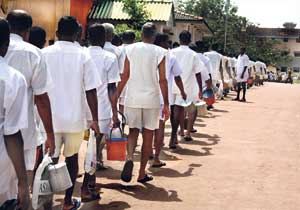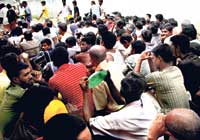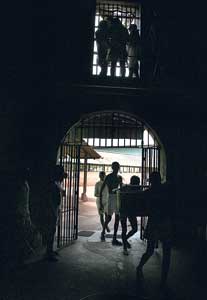
Condemned to a cramped-up lifeThe Welikada jail intended for 1,500 prisoners, is facing a huge problem of overcrowding with 4,522 inmates huddled together. Noon and on the menu is steaming hot rice, fish curry, bandakka curry and mallun. For those who are vegetarian there is dhal instead of fish. Everywhere one looks there are men in white, carrying pails and towels, walking to the spot assigned to them, for their lunch, after their morning’s work shift. Here and there are men in khaki. Even in the chapel, named so by the British because it takes the shape of a cross, there are men everywhere, looking down from a balcony running atop it or peering through heavily barred doors from the wings of the building. We are at the Welikada Prison and one fact is crystal clear. The prison built in 1844 by the British to hold a maximum of 1,500 prisoners, is facing a simple but at the same time complex problem.
Overcrowding. Now it is home to over 4,500 men – 300% more than its capacity and on January 7, when The Sunday Times visited Welikada, the roll-call was 4,522. Says Assistant Superintendent Emil Ranjan Lamahewage: “Welikada houses condemned prisoners, condemned prisoners who have appealed against the verdict, special prisoners, prisoners who have been sentenced to life imprisonment and prisoners who have appealed against their sentences and also remand prisoners.” All first offenders who are sentenced to more than a six-month term of imprisonment from the courts across the country and all those convicted at the conclusion of their cases while being held at the Colombo Remand Prison, the Magazine Prison and the Mahara Prison, are also here, he says. Explaining the prison system, Mr. Lamahewage said the second-time and third-time prisoners who have to serve long sentences are sent to Bogambara while those who are offenders for the fourth time or more who have been handed down sentences of more than three months imprisonment go to Mahara. However, all first offenders who have been convicted, achchu aya, but have more cases pending against them are also based at Welikada, aggravating the problem of overcrowding, The Sunday Times understands. They have to be kept at Welikada and sent to the different courts, says Mr. Lamahewage. A morning spent at Welikada, brings home the problem of overcrowding and also gives an insight into the routine of the prisoners.
The high security doors of the prison are unlocked with a clang at 6 a.m., after which the prisoners engage in their morning’s ablutions. Next it is roll-call time followed by the prisoners who are on the work schedule going to their “workplaces”.
Every hour, a gong tolls the time. Apart from those who work within, some are assigned to specific state institutions in Colombo while others are transported, not daily but whenever vehicles and jailors are available to accompany them, to prison camps across the country where there is work, says Mr. Lamahewage. But the “worker” prisoners do not include the condemned, the condemned and other prisoners who have appealed against their convictions, the special prisoners and the remand prisoners, he explains. The condemned are those who have been found guilty and convicted of crimes such as murder or possession of more than a kilo of narcotics like heroin and have been handed down the death penalty. There are 137 on death row and 294 who have been convicted but appealed against the death sentence, The Sunday Times understands, while 195 are serving life sentences. Sri Lanka has not implemented the death penalty which takes the form of hanging since 1976 while the pardoning of those serving life sentences and parolling long-term prisoners on “good behaviour” have not been happening for a while. Ranbanda* is serving a long sentence for murder but is now assigned “special duty” because his behaviour has been exemplary. A farmer who toiled hard to keep the home-fires burning, before “all this”, he, his wife and little daughter were living a reasonably comfortable life. He had an obligation because his aged mother was ill and needed looking after. “Trouble began after my wife who had been a garment factory worker got some EPF dues, because until she married her family depended on her income,” says mild-mannered Ranbanda. The dues came and his wife went home and never came back. She also took the little one with her. He was caught in a trap. His cultivations went to ruin. He felt helpless in looking after his mother. But most of all he missed his wife and daughter. He pleaded with his wife to come back. She did not heed his pleas. Time went by and he kept on pleading with her. In desperation, he asked her to come home or……..kasade katuganna (give a divorce). She refused but went to court to get alimony. He wanted to put the money in his daughter’s book but not give it to his wife’s family because he felt that they would live off it. He was angry and to restrain himself from doing wrong he brought his daughter home one day, when she was returning after school. One evening, soon after, the police came home and handed him some documents. He was embarrassed and angry. He took a sword and rushed to his in-laws house to “finish off everything”. He slashed his mother-in-law who was at the doorway and ran in but there was no one else at home. “Bella kepuwa,” he says sheepishly, explaining that he cut her neck. “Achchuwa avurudu 15.” (Sentenced to 15 years imprisonment)
His wife has divorced him and is married again. His daughter is a lamissi (young girl). As Ranbanda has been on good behaviour he works under the “special duty” category hoping for a parole as he has served nearly half his sentence. Prisoners like Ranbanda are many. In the chapel, a doctor is seeing the prisoners who are ill in one small room, with each one walking away with a small white slip of paper or carrying different coloured pills, blue…white, in their curved palms. The chapel’s A-3, B-3, C-3, and D-3 sections, the high-security areas, with secured cells house the condemned, special and life-sentence prisoners. “Into the ‘special’ category fall those from the underworld, prison escapees who have been recaptured, those who have been involved in gang robberies and those who have been convicted of terrorism,” says Mr. Lamahewage. They spend all their time in their cells, for they are let out only for half-an-hour each in the morning and in the evening for exercise, it is understood. Away from the chapel in the opposite corner a sea of heads is visible, awaiting their turn patiently before giant saucepans full of food. The prisoners squat on their haunches, while row by row, in orderly manner, the frontliners scoop food onto their plastic plates with large ladles and move on to eat their mid-day meal. The prison is neat and clean. The obvious problem seems to be overcrowding, even the “visiting area” where loved ones meet those jailed being shockingly inadequate. A humane issue which needs to be addressed. (*Name changed to protect identity) More prisons, more education needed
Conceding that Welikada has been facing the problem of overcrowding over the years, the Commissioner General of Prisons, Major-General Vajira Wijeyagoonawardena said that plans are being implemented to set up four prison camps in Kiribawa, close to Rajanganaya, Mahawa, Embilipitiya and Pelwatte to ease the burden. “The camp at Mahawa is already under construction,” he said, explaining that the four camps once set up will help reduce the numbers by about 1,500 at Welikada.Under United Nations standards condemned prisoners have to be provided maximum facilities, with each such prisoner having two square metres to himself in his cell. “Now we have four people sharing one cell,” he said. Preparations are also being finalized to release prisoners who are serving life who behave well, it is learnt. The long term solution to prison overcrowding is to curb crime and that, according to Major-General Wijeyagoonawardena, can be ensured by educating people. Seventy-five percent of the prisoners are uneducated, thus leading to their minds not being developed which in turn leads to unemployment resulting in crime. “Education is the key to reducing crime and the need for more prisons.” |
|| Front
Page | News | Editorial | Columns | Sports | Plus | Financial
Times | International | Mirror | TV
Times | Funday
Times || |
| |
Reproduction of articles permitted when used without any alterations to contents and the source. |
© Copyright
2008 | Wijeya
Newspapers Ltd.Colombo. Sri Lanka. All Rights Reserved. |



